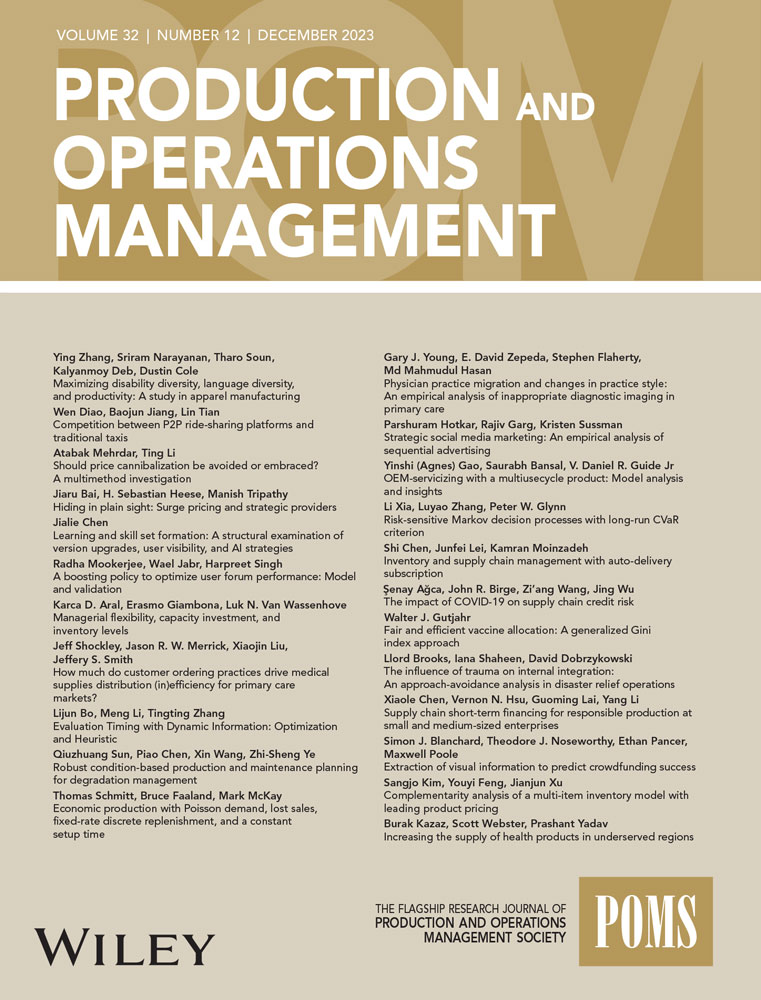快递:与战略消费者的假冒竞争
IF 4.8
3区 管理学
Q1 ENGINEERING, MANUFACTURING
引用次数: 0
摘要
本文研究了在两个时期内销售耐用品的品牌企业与在第二个时期进入市场的欺骗性仿冒者之间的竞争。两家公司进行价格信号博弈,其中品牌公司在两个时期内设计其价格策略,而战略性消费者则决定是先购买正品还是等到第二个时期再购买。我们发现,如果两种产品的质量差距足够大,品牌企业可能会从假冒竞争中获益。我们的直觉是,品牌企业会在第二期定价较高,以示其产品的真实性,从而诱使更多消费者提前购买正品。这种策略可以让品牌企业同时提高第一期价格和需求,从而有效缓解时间不一致问题。否则,当质量差距较小时,假冒竞争会导致正品利润减少。这些结果在基础模型的多个扩展模型中都保持稳健,包括部分知情或天真消费者、非对称零售渠道、购买后后悔以及内生假冒产品。本文章由计算机程序翻译,如有差异,请以英文原文为准。
EXPRESS: Counterfeit Competition with Strategic Consumers
This paper investigates competition between a branded firm selling a durable good over two periods and a deceptive counterfeiter entering the market in the second period. The two firms engage in a price signaling game in which the branded firm designs its price strategy over two periods, and strategic consumers decide whether to buy the authentic product upfront or wait until the second period. We find that the branded firm may benefit from the counterfeit competition if the quality gap between the two products is sufficiently large. The intuition is that the branded firm would charge a high second-period price to signal its authenticity, inducing more consumers to buy the genuine product upfront. This strategy allows the branded firm to increase its first-period price and demand simultaneously, thus effectively mitigating the time-inconsistency problem. Otherwise, when the quality gap is small, counterfeit competition leads to reduced profits for the authentic product. These results remain robust throughout several extensions of the base model, including partially informed or naive consumers, asymmetric retail channels, post-purchase regret, and endogenized counterfeit.
求助全文
通过发布文献求助,成功后即可免费获取论文全文。
去求助
来源期刊

Production and Operations Management
管理科学-工程:制造
CiteScore
7.50
自引率
16.00%
发文量
278
审稿时长
24 months
期刊介绍:
The mission of Production and Operations Management is to serve as the flagship research journal in operations management in manufacturing and services. The journal publishes scientific research into the problems, interest, and concerns of managers who manage product and process design, operations, and supply chains. It covers all topics in product and process design, operations, and supply chain management and welcomes papers using any research paradigm.
 求助内容:
求助内容: 应助结果提醒方式:
应助结果提醒方式:


